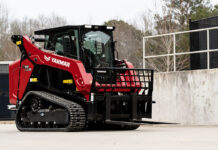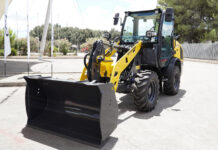Life is full of lessons, some learnt easily and others not.
When it comes to creating things or harvesting products, you may be advised to have the correct tool for the job at hand. In business matters, you would hear that diligence and patience pays off, with the latter indicating that you could be in for a long haul.
In one of Cape Town’s northern industrial suburbs, we find Afriline Civils. Founded in 2008 by its dynamic present-day General Manager, Johan Marais, the company has carved a niche market for itself over the last decade and a bit.
“We operate within the entire Southern Africa region and pride ourselves on tailoring solutions for our clients’ individual needs with a hands-on approach”
he says. “Projects are professionally supervised and controlled by a management team that is directly involved in planning, operations and post-project problem-solving.”
Since its inception, Afriline Civils has successfully completed projects in township infrastructure, which includes bulk water supply and reticulation, upgrading existing infrastructure, road construction, structural concrete and pump stations. Not content with working in urban areas only, Johan and his team of dedicated professionals have successfully ventured into the mining industry, especially in the Northern Cape, focusing on bulk water systems, dewatering, water treatment and pumps, hazardous waste stores and other mining infrastructure. Even the telecommunications sector has benefitted from the company’s expertise and enthusiasm where it has installed optic fibre, high mast towers and fine-tuned infrastructure maintenance.
Afriline Civils’ core management team consists of Johan Marais, the General Manager, Delaine Fortuin, Financial Director, Morne Marais, Procurement Manager and Liam Fisher, Contracts Manager. All four are shareholders of the company.
Johan, in particular, is a born entrepreneur. Having started Afriline Civils 10 years ago, he is always looking out for new opportunities and challenges and when a unique opportunity to source timber recently appeared on his radar, he grabbed it. A historic wine farm in the Somerset-West area had almost 790 hectares of gum and pine forests that it wanted fell to make way for traditional Cape fynbos and so return its property to one where nature conservation ruled supreme.
“We bought the standing timber and have set about harvesting it for local consumption and export as we considered this to be a sound business opportunity”
he explains. “But, as in our civil and mining operations, we considered it paramount to have the correct timber handling and loading tools and therefore researched the market carefully and asked business associates who are in the know.”
“Once we had taken a decision on what equipment to buy, we went straight to Bell Equipment’s Sales Representative Fiona Johnson to enquire about buying four Bell 225F Loggers”
he adds. “Fiona has been calling on our company for about four years and we’ve never bought anything from her until now, which in itself is a lesson in diligence and tenacity. She never gave up on us and when the time was right, she could supply us with the correct equipment, technical back-up and all at a competitive price.
“We took delivery of two of the Bell 225F Loggers in March and the other two in April 2019 and they have made an immediate impact on our production,” Johan says. “We’ve been felling, extracting and processing timber for just over a month and already we’ve achieved 123% of our targets which we put down to having the correct new timber handling equipment that is designed for this type of work. We also have to give credit to our experienced machine operators who easily took to the new Bell 225F Loggers.”
Felling is done manually by several teams with chainsaws. Timber is cut into varying lengths depending on whether it is destined for a local sawmill or for the export market. Timber was successfully harvested from 27 hectares in the first four weeks of operation.
“We’ve found that timber harvesting is much like other production-driven disciplines as you have to micro-manage and micro-cost each step of the process on every day,” he explains. “We really concentrate on the cubic-metres of timber we can extract every day and I cannot stress enough the important role that our Bell 225F Loggers play in this as without them we’d be battling.”
“We’re on a steep learning curve regarding timber harvesting and we’re keen to explore what other products Bell Equipment and its Matriarch brand can offer us in this exciting new field.”
Source: Bell Equipment


![[Job Story] Ten Liebherr Excavators at Work on West African Railway Project](https://www.heavyquipmag.com/wp-content/uploads/2024/11/liebherr-mota-engil-3-1-218x150.jpg)






![[Job Story] South African Diamond Producer Relies on TOMRA’s XRT Sorting Technology for Recovery Ops](https://www.heavyquipmag.com/wp-content/uploads/2024/05/TOMRAs-XRT-technology-withTOMRA-Insight-delivers-big-results-at-Mothae-Diamonds-in-Lesotho-218x150.jpg)

 Copyright 2017-2023 All rights reserved.
Copyright 2017-2023 All rights reserved.